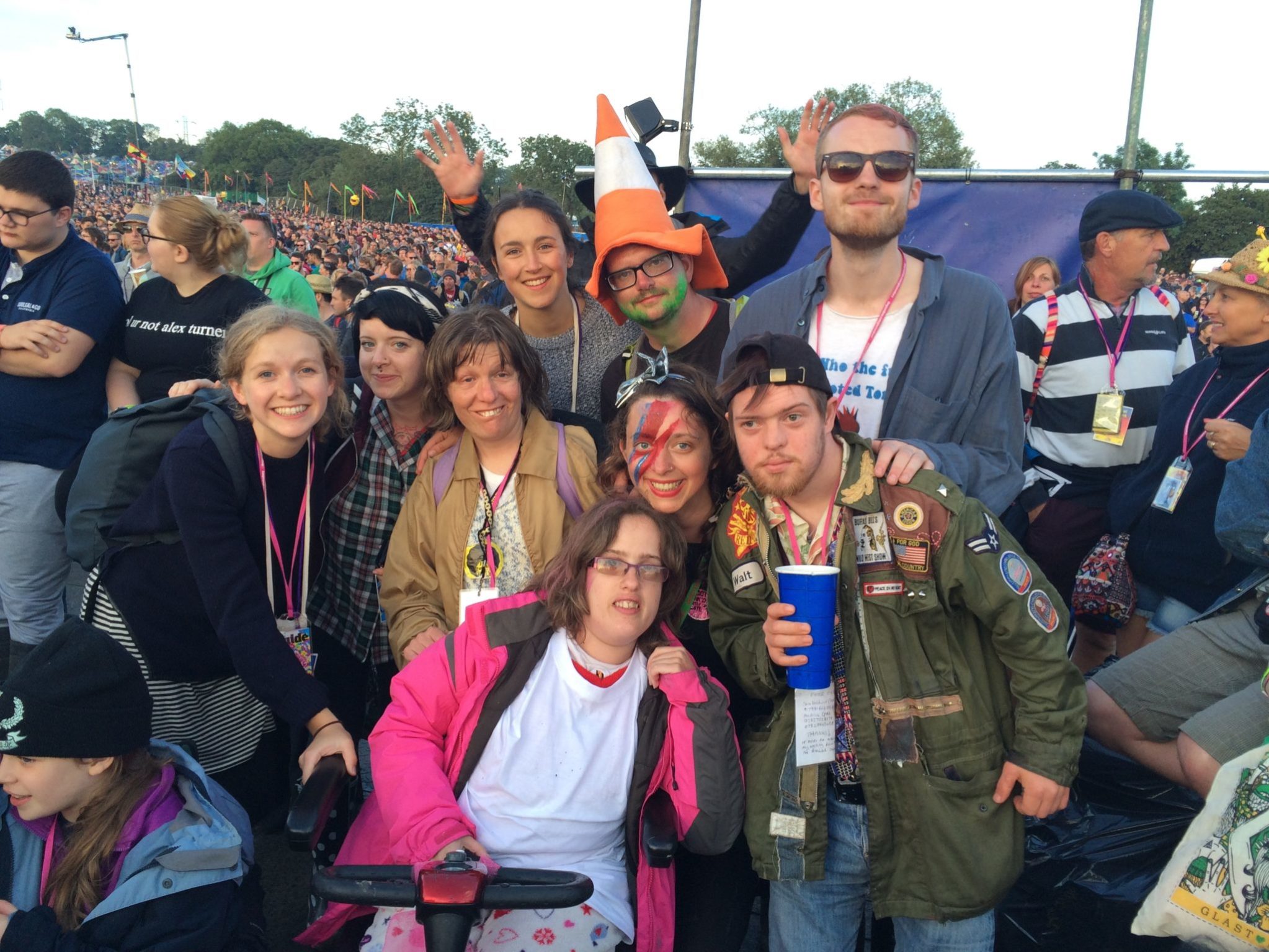Zoe Richards and Kai Jones from Learning Disability Wales explore how the arts in Wales are becoming more accessible and inclusive for people with a learning disability.
“All the world’s a stage and all men and women merely players” – William Shakespeare
“Life imitates art far more than art imitates life” – Oscar Wilde
“I want to break free!” – Freddie Mercury
The performing arts come to us in its many forms in Wales. Dance, theatre, music, opera and mime are vibrant and alive both in our cities and rural communities. So, what does that look like for people with a learning disability? Are they merely spectators or are they at the centre of making art in Wales?
Participatory theatre
Taking a broad look at the scene we know Wales is wealthy in participatory theatre. The award winning Hijinx Theatre has been at the helm of producing art that imitates life for many years. They have not stood still with progress either. They run Odessey for people with a learning disability to take part in theatre and they now boast the Hijinx Academy, training the actors of tomorrow who have a learning disability or autism.
We also know that there are artists and practitioners changing the landscape of theatre across the country. Beth House and Elise Davison came together to form the innovative Taking Flight Theatre Company, producing truly accessible, immersive and inclusive work for everyone by everyone. We also have more localised groups such as Rising Stars from the Swansea valleys. Sherman Theatre’s Sherman 5 scheme in Cardiff has worked hard to open up participation and attendance in theatre to people who face barriers and/or disadvantage.
Disabled actor roles
We know that there is a great field of specialised work happening in Wales and we are certainly leading the way. Our next steps must now be to see better representation of learning disability in mainstream theatre and arts.
In the recent UK tour of Hairspray the musical we hear the lead character being called a ‘spastic’ and ‘retard’ (Mencap Cymru is currently challenging use of these words in the script with the producers). Later in the show we see the lead character being placed in a special education class, with all of the characters in the class played by non-disabled actors. This led to much amusement for the audience on our visit, as they laughed along to the actors’ over-emphasised portrayals of disabled people. How much more positive and stronger could the message have been, and how different the audience reaction, if only those characters were played by disabled actors? We do indeed now have a talented pool of actors to take up those roles.
The world of arts and culture does not only exist for the consumer. The cultural economy in Wales is vast and we must see marginalised groups contributing not only as the consumer but as the creators and drivers of this economy.
Relaxed concerts
For consumers in Wales there is Hynt, a national access scheme that works with theatres and art centres to make a consistent offer to carers and personal assistants. Venues are also now more understanding and offer relaxed performances, signed performances and audio described performances. Theatres are now offering relaxed performances on their family shows. Most pantomimes across the country offer a relaxed performance, with no pyrotechnics (fireworks), quieter music and special effects, no loud bangs, and house lights (audience lights) left on and not
dimmed.
In July, St David’s Hall in Cardiff hosted a relaxed concert by the BBC National Orchestra of Wales, catering for children and adults with autism, sensory and communication impairments, and learning disabilities, as well as individuals who are Deaf, hard of hearing, blind or partially sighted. At the concert there was a relaxed attitude to movement and noise in the auditorium. Concert goers could move about, sing, dance or just watch. ‘Chill out’ spaces were available outside the auditorium, picture communication systems were projected on large screens, and there was British Sign Language interpretation and Audio Description. These adjustments were put in place after the BBC National Orchestra of Wales worked with the third sector to understand the needs of disabled concert goers, so everyone could take part and enjoy the performance. Following the Cardiff concert, the BBC National Orchestra of Wales took the relaxed performance to the BBC Proms in London, making it the first ever Relaxed Prom.
Access to music
Within the music sector, venues, promoters and festivals are more aware than ever of the need to make their facilities and events accessible for disabled people. This is largely due to the efforts of two charities: Attitude is Everything and Stay Up Late.
Attitude is Everything is improving Deaf and disabled people’s access to live music by working in partnership with venues, audiences, artists and the music industry. Some of the largest music festivals in the UK are now signed-up to Attitude Is Everything’s Charter of Best Practice, including Glastonbury, Reading and Leeds, Download, Latitude, and British Summer Time Hyde Park. The charity also work with venues of all sizes throughout the UK – from Manchester’s Band on the Wall (340 capacity) to Wembley Arena (12,500 capacity) – to help them meet the requirements of the Charter and become disability-friendly venues.
Awarded in three stages (Bronze, Silver and Gold) the Charter supports event producers to demonstrate an ongoing commitment to improving accessibility, and to go beyond the legal obligations set out in the Equality Act so that deaf and disabled customers are provided with a fair and equal service. In July it was announced that the UK Live Music Group, which represent views of Britain’s live music industry, had given its official backing to Attitude Is Everything’s Charter of Best Practice – promoting it as the “industry standard” in access provision.
In Wales, we should acknowledge the work that Festival No.6 (Silver), Hijinx Unity (Silver), Green Man (Bronze), Pride Cymru (Silver), and the Motorpoint Arena in Cardiff (Silver) have done in being awarded Charter status. However, as these are the only Welsh venues and festivals currently meeting the requirements of Attitude Is Everything’s Charter of Best Practice it is clear that we have some work to do to ensure disabled music fans in Wales are able to access and enjoy live music in a way that their non-disabled friends take for granted.
The right to stay up late!
While Attitude is Everything have being doing great work in improving the access to venues and festivals, questions still remain about the support that many disabled people rely on in so they can attend an event. This is particularly important for people with a learning disability and/or autism, and especially important when it comes to attending events that finish late at night.
Stay Up Late, based in Brighton, have been campaigning for over 10 years for people with a learning disability to have full control over what they want to do in the evenings. Obstacles that prevent this include: lack of support to go out; safety; no one to go with who likes the same things; not being aware of what is on (including information on events that is easy to read); problems with transport; and for many, the biggest obstacle of them all – inflexible shift patterns of support staff.
These obstacles make life difficult for music fans with a learning disability who want to go out and enjoy live music. Many arts events take place at night, but this is almost a rite of passage for gigs where a headline act rarely goes on until after 9pm. For people in residential care or supported living, jarring uncomfortably with this is the stubborn inflexibility of the staff handover to the night shift. This means that even if you have been lucky enough to get out to a gig, you will be forced to leave long before the headline band takes the stage – and chances are that you would have been prevented from going in the first place.
Stay Up Late work with service providers so they operate more flexible shift patterns, enabling the people they support to have more choice and control over what they do at night. Yet even when it possible for support staff to accompany you to a gig, do you really want them to? What if – shudder – they don’t even like music or going to gigs?! When we have control over our lives we are able to choose who we want – or don’t want – to go to events with. You can enjoy yourself so much better when you know the people you are with share the same interests as you.
Gig Buddies
This is where Gig Buddies can help. Gig Buddies matches people with a learning disability with volunteers who share the same music tastes so they can go to gigs. It’s that simple. Originally set up by Stay Up Late in Brighton and East Sussex, the Gig Buddies concept has now spread all over the UK, with over a dozen regional Gig Buddies projects either in development or having already started.
In Wales, Conwy Connect have been so successful with their Connect Buddies project that they have been awarded three years funding from the Gwynt y Môr Community Fund. Connect Buddies helps people attend events or other activities that they would otherwise be unable to go to – because they don’t have a support worker, or they only have a support worker until a certain time. The service is available to people who live in the following postcode areas along the north Wales coast: LL18, LL19, LL22, LL28, LL29, LL30, LL32 and CH8. For more information phone Alison Fletcher on 01492 536486 or email connect.buddies1gym@gmail.com.
At Learning Disability Wales we have been working with Stay Up Late so we can bring Gig Buddies to the rest of Wales. Our vision is to create and nurture a network of Gig Buddies projects so that wherever you are in Wales, if you have a learning disability and need support to get out to events and stay up late, you will be able to find a Gig Buddy to support you. We hope to have news about the first steps on this journey very soon.
Update April 2018: Learning Disability Wales has now launched Ffrindiau Gigiau Caerdydd / Gig Buddies Cardiff, thanks to funding from First Choice Housing.
Are you involved in making the arts in Wales more accessible for people with a learning disability? We would love to hear from you – please get in touch.
Zoe Richards, Young Persons and Carer’s Manager
Kai Jones, Information Officer
More information
Taking Flight Theatre Company
Sherman 5
Hijinx Theatre and Unity Festival
Hynt national access scheme
Attitude is Everything
Connect Buddies
Stay Up Late
Gig Buddies



 >
>
 >
>
